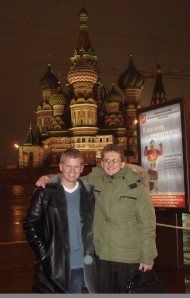
It was February 2008, and I was living in Moscow with a Russian host family. It was the evening of Election Day–a day when Russians voted for their new president, President Medvedev. The occasion gave me the opportunity to talk to my Russian host dad about a topic I had avoided: communism and politics in Russia.
Dmitry, a tall man with long, black hair and a hearty laugh, was a father in his mid thirties. He was a child when the Soviet Union began its transition into a democratic Russia.
“And that was something that we could not understand,” Dmitry said, lowering his cup of tea. “For the first time in our history, the leader of our country was walking among the people.”
“For as long as I could remember,” Dmitry continued. “Our leaders would never talk with us. They would only talk to us. And they would tell us that the West was our enemy and we must always be ready to go to war with them. Few of us knew anyone from the West, and few of us had known anything outside of our own country. But when Gorbachev became president, everything started to change. Not only would he talk with us, but he would walk among us. He said that he wanted to be more open with the West and with the world.
“When our country opened up to the rest of the world, we started to understand something. People in the world weren’t as different from us as we had been told. The West was no longer an enemy…but more like long-lost family.”
My host dad was thoughtful for a moment before adding, “This is one of the reasons why we chosen to have an American stay with our family—so we could discover how similar we are.”
Sitting in that kitchen in Moscow, munching wafers and sipping tea with my host father, I had an epiphany. I suddenly realized (and felt) that all people—from all walks of life—are people with hopes, dreams, tears, and laughter just as real and as meaningful as mine.
In that moment, I looked at my host father and saw him as a long, lost member of my family—as a veritable father figure in my own life.
This was a very unique revelation, because when my real father was my age, he lived in Berlin at a time when the Berlin Wall divided the East from the West. In his mind, he always believed that Russians were “the enemy” and that America and Russia would never see eye to eye. And yet, twenty-five years later, his son was living in the home of a former Soviet, sipping tea and having deep and meaningful conversations with the man.

Later that week, I went for an evening walk on Red Square. I can remember looking around at all of the different people. They were smiling, laughing, and taking pictures. I’m sure there were Russians, Ukrainians, Armenians, Americans, and numerous other individuals whose nationalities I couldn’t identify. But for the first time, I didn’t really see them as people from different countries—the differences didn’t really matter to me.
What really mattered to me was seeing them as real people. Introverted as I am, I wanted to have a conversation with them. I wanted to learn about their lives, and their perspectives. I no longer wanted to enumerate our differences. I wanted to discover our similarities. I wanted to breach the perceived “walls” that divided us and walk and talk with them. I wanted to find family in them.
Though the Berlin Wall may have come down over 20 years ago, that night on Red Square I felt as though one conversation with my Soviet father had torn down a wall in my heart.
Search for the walls in your own heart. Once you find them (for most assuredly, you will), I invite you to tear them down. Doing so may open yourself to the chance of finding family, and turning enemies into friends.
Originally published on ForwardWalking.com


You must be logged in to post a comment.